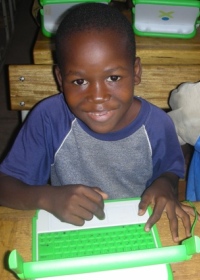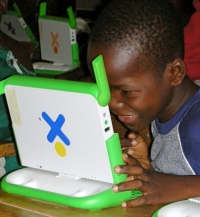During the summer of 2008, One Laptop Per Child Mali, in collaboration with LAPTOP Magazine, conducted a pre‐pilot program with 30 XO laptops. The program was organized as a summer camp in the village of N'Tintou, Mali with 30 students in the program, 2 teachers, 4 volunteers, and one school director. For 8 weeks, we had teacher and volunteer training in addition to instruction of academic subjects and activities for the students.
OLPC Mali Pre-Pilot Results
We have now released the OLPC Mali Summer Camp Program Final Report (English and French).
With a small‐scale program such as this pre‐pilot most of the data collection and evaluation is of a qualitative, rather than quantitative nature due to the small sample size.
While it may be difficult to directly generalize the results of this program to a larger more extensive deployment of XOs in Mali (or in another country, especially), this is not reason to discount the results, as the responses and reactions are quite real and give voice to those involved in this initial stage.Specific results we found during the pre-pilot summer camp were:
Teacher Concerns
- Create Programs specific and adept to the school system of Mali
- Create Pre‐planned activities of math, reading, typing, history, geography, etc.
- Provide Ready‐made lesson plans to facilitate their tasks of teaching with the computer and provide them with readily available learning tools.
Challenges
- High cost of electrical installation
- Extremely high cost of Internet connection
- Better mesh network connectivity through a server
- Evaluation of program by an independent group
- Maintaining sustainability and continuation of program with support of
ministry of education
Successes:
- XOs introduced into Malian schools for first time ever
- Electricity installed at N'Tintou Elementary School
- Great feedback from community
- Parents are now more interested in their child's education
- Children's interest in education is augmented, and learning at home encouraged
Some of the key experiences from the summer camp that really stuck with me was the rate at which both student and teacher learned to use the XO, and the different ways they found to apply the activities and applications from the computer to their traditional ways of learning. For example, a spelling session is included in every reading activity, and it played a big part in the kids learning how to type and familiarize themselves with the keyboard during the program.
There was a big sense of collaboration both between teacher and student and the students themselves. Everyone worked and learned together. For example when your neighbor did not know how to do something, you automatically showed them how to do it. The sense of belonging and family was all around and highly encouraged and practiced.
OLPC Potential in Mali
We concluded from the small program that there is a huge potential for the one laptop per child project here in Mali and that it could bring about great changes to the entire education system, but a bigger pilot program will need to be put in place in order to have a better understanding of the different issues that arise when dealing with introducing computers to millions of children.
OLPC Mali's goal is to conduct a larger scale program, with students from grades 1‐9 in both primary and secondary schools. Electricity will need to be installed in the schools chosen, as well as Internet and servers to allow for better connectivity via the mesh networks and sharing of files and documents.
Internet is essential for the next stage of the pilot, as it will let the children connect to the world and give them access to the largest encyclopedia available, and information and other educational tools.
As far as the future for OLPC Mali is concerned, I think that with the different proposals on the table at the moment and the support of the government we will reach our goal of providing every Malian child with a laptop. I think that between all the marketing and promotion we do for the project to inform the people of Mali, and the different private schools that are also interested in implementing the project in their schools, our presence and objectives are becoming more well known and even encouraged.
Salimata Fandjalan Bangoura is the President of One Laptop Per Child Mali




notice their web page
http://www.olpcmali.org/
© 2008 One laptop per child mali. All Rights Reserved.
It's of course completely legal, but I sort of feel something is not quite right with being ready and willing to take but not sharing back.
Yama,
You have sent me a not very nice email about this, and I replied to you very politely that I do not see any issues here with the all rights reserved mentioned on our site.
As far as I am concerned, EVERYTHING on our site at www.olpcmali.org is open for everyone on the world wide web to see, use and share. If we write a report documenting OUR experiences, I believe that we have the full right to that document, that does not mean that we are not sharing it, or that other people cannot use it for their own benefit, presentations, etc.
The time and energy you are spending on this issue, I think that if you used that to instead promote the work that we are doing here in Mali or what's happening with OLPC in other parts of the world, that would serve us all better.
Best,
Sali
Yama & Sali,
I don't see what the issue is. So Sali says her site is copyrighted. What's the big deal? You can still quote her site under fair use, like any work, anywhere.
In addition, Sali made OLPC Mali happen, so power to her for wanting to control how that work is shared. But ya know, I don't think she's thinking the way you think she might have thought about what that little circled c means.
Rather than an attitude of take, I expect she was just using boilerplate, and more trying to protect her work from those who scrape than those like you, hoping to build.
I congratulate OLPC Mali for their wonderful work.
And I hope to congratulate them with even more enthusiasm when their website indicates they join the cause of Open Source and Open Content.
I agree, it's probably not their fault, but of Dizzain, Inc. of New York, who contributed the website. This looks exactly the Microsot neocolonial way, i.e, 'here's something for you developing nations for "free", but you are not allowed to share it'. Hope they help fix it
@Wayan:
"But ya know, I don't think she's thinking the way you think she might have thought about what that little circled c means."
I must admit that I normally completely ignore the copyright notices on web-sites.
If you really do not want people to print out and distribute a page on an open website, what is it doing there.
But Yama is right that things would have been better if the boilerplate had been replaced with a real license (suggestion: one of the Creative Commons).
We can ask Sali whether she could elaborate how she would prefer to have her work distributed?
Winter